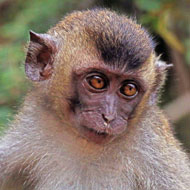
Cloned macaques said to be growing normally
In a world first, Chinese scientists have cloned monkeys using the same method that was used to produce Dolly the sheep.
Two genetically-identical macaques were born six and eight weeks ago at the Institute of Neuroscience of Chinese Academy of Sciences. They have been named Zhong Zhong and Hua Hua, after the Chinese adjective Zhõnghuá, which means Chinese nation or people.
The milestone has been presented in the journal Cell.
Explaining the implications, senior author SUN Qiang, said: "There are a lot of questions about primate biology that can be studied by having this additional model.
“You can produce cloned monkeys with the same genetic background except the gene you manipulated. This will generate real models not just for genetically based brain diseases, but also cancer, immune or metabolic disorders, and allow us to test the efficacy of the drugs for these conditions before clinical use."
The clones were created using somatic cell nuclear transfer (SCNT), the same technique used to create Dolly the sheep over 20 years ago. Researchers remove the nucleus from an egg cell and replace it with another nucleus from differentiated body cells. The reconstructed egg then develops into a clone of whatever donated the replacement nucleus.
Previously, differentiated monkey cell nuclei proved resistant to SCNT. SUN Qiang and his team overcame this by introducing epigenetic modulators after the nuclear transfer, that can ‘switch on’ or ‘switch off’ the genes that are inhibiting the development of the embryo.
The researchers found their success rate was improved when they transferred nuclei taken from foetal differentiated cells, such as fibroblasts. Using this technique there were six pregnancies in 21 surrogates, producing the two healthy babies. However, using adult monkey cumulus cells, there were 22 pregnancies in 42 surrogates, producing two short-lived babies.
Researchers will monitor Zhong Zhong and Hua Hua’s physical and intellectual development. So far, they are said to be growing normally for their age. They plan to continue improving their technique. More macaque clones are expected to be born in the coming months.
Going forward, the team plan to continue improving their technique, which they say will benefit from future work in other labs. The researchers stressed that they are following strict international guidelines for animal research, but encourage the scientific community to discuss what should and shouldn’t be acceptable practice when it comes to cloning non-human primates.
Image by Sharp Photography, sharpphotography/Wikimedia Commons/CC BY-SA 4.0



 The Veterinary Medicines Directorate (VMD) is inviting applications from veterinary students to attend a one-week extramural studies (EMS) placement in July 2026.
The Veterinary Medicines Directorate (VMD) is inviting applications from veterinary students to attend a one-week extramural studies (EMS) placement in July 2026.